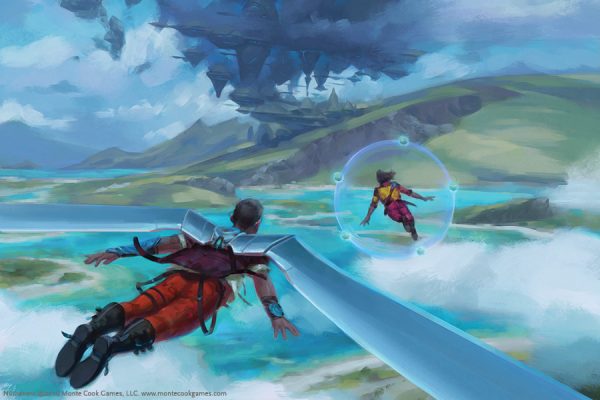Monte Says is a regular feature here on the Monte Cook Games website, in which Monte talks about topics related to the Cypher System—or anything else on his mind!
There are three entities at any roleplaying game table: the GM (game master), the players, and the rules. Every roleplaying game differs as to which of these three has the most authority. Sometimes, the rules are extremely comprehensive—players and GMs can (and do) get things incorrect—in that case, the rules have the most authority. Other times, the GM runs roughshod over the game, creating a railroad adventure, so the GM has all the authority. (I use “authority” here rather than “power” because authority is given, and power is taken.)
In the Cypher System, I strove to split this authority equally between the GM and the players (and not the rules). Some call this “rules lite,” but I’ve never cared for that term, since it can mean so many different things to different people. So let’s delve a little deeper.
If you look at the GMing section of the Cypher System Rulebook (or Numenera, or The Strange—they all have the same philosophy) you’ll see that it’s the people around the table and not the rulebook in authority. That’s explicitly stated. If something’s not working in the rules, change it. If you want to do something a different way than the rules state, do it. Even the rules themselves contain ways to break and bend them to suit a good narrative or character moment. The Modifying Abilities on the Fly rule (Cypher System Rulebook, page 226), for example, is a rule on how to best break the rules.
But it’s even more interesting to look at how authority is divided between the GM and players, because it’s not just a matter of decreasing the authority of the rules, it’s also about increasing the authority of those at the table. I feel that many recent games have strived to give the players more authority by taking it from the GM. They’ve given players control over the narrative so they can insert events, creatures, or objects into the story, whereas originally that was sole the purview of the GM. That’s cool, but I went a different way.

Players in RPGs have character control. If my character is Thomas Littlefield, no one but me—not even the GM—can dictate what Thomas does (unless there’s something like mind control involved). So character control is a sort of sacrosanct expression of player authority. And in the Cypher System, players have more authority over their characters than they have had in other roleplaying games. How? Because some of the randomness of the rules has been taken away. Here’s what I mean:
Let’s say your character is skilled in searching. Traditionally, you roll a die and your skill affects that roll in some positive way. It works the same every time. So it doesn’t matter if you’re looking for your keys in the morning, or looking for the last digit of the code to stop the nuclear bomb from exploding, your skill affects the random roll in the same way. In the Cypher System a player can put more effort into that second case (deciding that it’s more important). In other words, the player has more control over how the character interacts with the story.
Additionally, through the use of minor and major special effects, the players have even more character control—granting them authority to add in additional effects for really well-performed tasks. It’s not quite narrative control, but special effects allow players a lot of leeway of directing how their character interacts with the story in an open-ended (not just success/failure) way.
Lastly, the ability to spend XP to reroll helps players avoid a botched roll in a clutch situation. This can be crucial to a player feeling like they have control over their character’s destiny and wellbeing, but at a cost.
All of this means the way the characters interact with the narrative is more likely to resemble a story, because if a writer was scripting the whole thing, the crucial, more important attempt would get more attention and be more likely to succeed, in the end. In a fully scripted tale, it’s less likely (although not impossible) that a very competent person would botch an important attempt at something. If they did, it would be to show how difficult the task really was.
The GM in Cypher retains full narrative control, but players have a lot of character control. The GM controls the NPCs, and the events and reality outside of the characters—and that line is not blurry. But within the realm of their own character, the player wields incredible authority. All of this works together to tell a good story (and have a lot of fun).